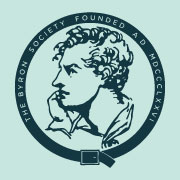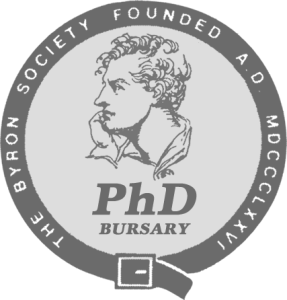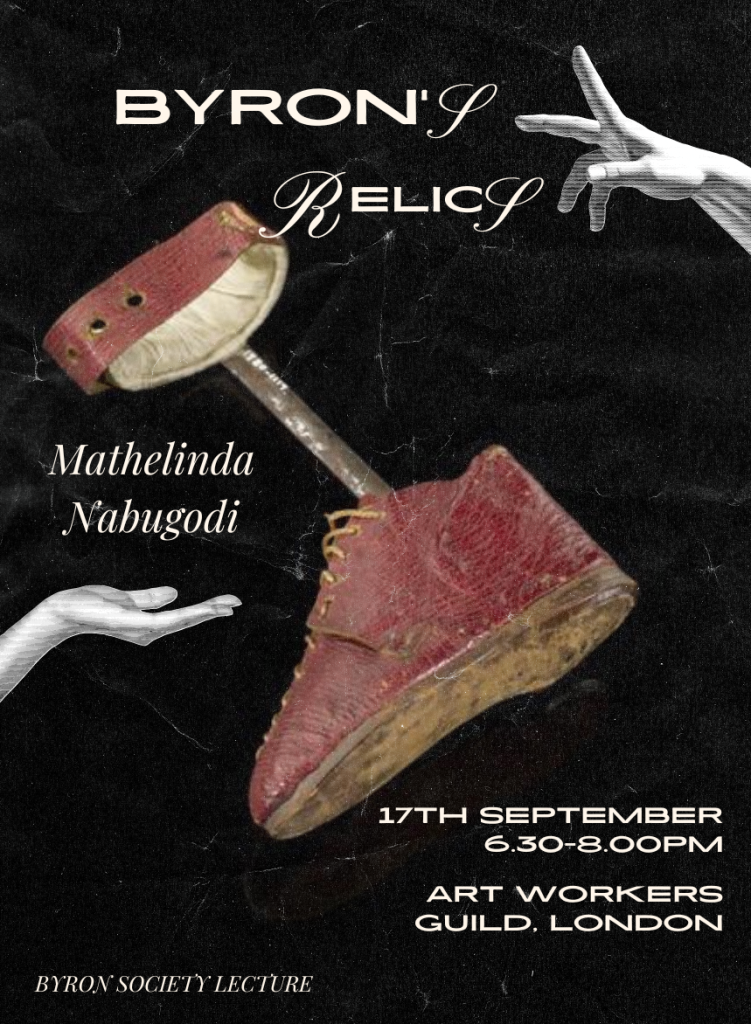by Kaiwen Hou, 3rd June 2019.
(Based on a paper given at the 2019 International Student Conference in Messolonghi, for which Kaiwen received a Byron Society Grant).
Lord Byron produced Cain when “a wave of blasphemy prosecutions [had] swept through England” (Schock: 86). As a controversial response to such a crisis, Byron dramatically revised the myth of Cain and shaped the first human murderer as a rebellious hero pursuing knowledge and the truth of life with great revolutionary passion against rigid religious control on free thoughts. After Cain had been published, Walter Scott thought it made Byron “certainly matched Milton on his own ground” (Scott: 256). For the Romanticists, Byron’s Cain was like Milton’s Satan because they both evoke revolutionary passion and share similar features. In Paradise Lost, the villain figure Satan’s image is viewed to be heroic in the first two books of the epic because of Milton’s seemingly glamorous description. Also, because Paradise Lost was written after the English Civil War, considering that Milton was a radical puritan, it was believed that he threw his unfulfilled revolutionary passion into the rebelling figure Satan. Under this circumstance, when being accused of blasphemy and profanity and severely suppressed, Byron used to shelter himself behind his devout predecessor Milton. He said, “If Cain blasphemous, Paradise Lost is blasphemous.” (Byron: 201) Since Milton’s reputation as a biblical poet had been confirmed (Schock: 27), this excuse was more like a satire indicating the authority’s being self-deceived to suppress political reading of anti-Christian works, considering the wide acknowledgement of Milton’s “revolutionary thinking” among the radicals of the time. However, Paradise Lost actually cannot be blasphemous. For those who would like to insist on Satan’s God-like glamorous figure, Milton relentlessly accuses Satan even in the first two books for his rebellion:
… with ambitious aim
Against the throne and monarchy of God
Raised impious war in heaven and battle proud
With vain attempt. (Milton: Ⅰ. 41-44)
The words “ambitious aim” and “vain attempt” just indicates Satan’s doomed failure “With hatefulest disrelish writhed their jaws/ With soot and cinders filled” (Milton: X. 569-570). The failing result emphasises the rebellion is a mistake with vanity, and that the Christian values are glorious and undefeated. Thus, in Paradise Lost, the “right” way for humans is to be tamed for redemption. The essence of Milton’s Satan is to strengthen Christian values and restraints. Nonetheless, the overreading of Milton’s Satan indicates people’s appeal for a change of the rigid conventions in portraying this kind of antichrists. The arguments he arouses provides, maybe not intentionally, a perfect womb for the breakthrough of the anti-Christian figure in Cain.
Pietro Novelli, Cain Killing Abel, The National Library of Scotland
The play starts when Cain refuses to pray with his family led by the parents Adam and Eve to show gratitude to God. Cain does so for he feels that he is destined to die so he does not owe anything to God. The only way of avoiding death seems to be the fruit on the tree of life in the Garden of Eden. However, his parents plucked the fruit from the tree of knowledge and were expelled from the Eden by God for their violation of God’s order. Cain cannot agree to be judged as sinful for his parents’ eating the Forbidden Fruit, because life and knowledge are both good. To him, it is a pity that his parents have had the knowledge but are destined to die, and a shame that they feel so guilty to have knowledge that they indulge themselves in being controlled and tamed for the so-called redemption. Cain’s untamed behaviour arouses his parents’, especially Eve’s anxiety and anger, and their irritation is even amplified by his self-awakening towards a pursuit of knowledge and liberated life. At this time, a spirit Lucifer comes up and claims himself as immortal. He leads Cain to appreciate the Abyss of Space, from which Cain gets a voyage revealing both clear and vague truth of the universe. After he witnesses the grandeur of the world, Cain breaks with the restricted and manipulated life. The action he finally takes is to kill the symbol of blind religious belief, Abel, who is also his younger brother. The play ends with Cain’s self-redemption by endeavouring to defeat the destiny written in blood through positive and active human acts.
***
Cain’s rebellion composes a successful process of humanistic self-awakening, and his awakening is not accomplished suddenly. It germinates in his suspicion of the justice of God, where Cain encounters the contradiction between his own thinking and God’s judgement on his family’s sin and being expelled from the Eden.
Cain. Why not?
The snake spoke truth; it was the tree of Knowledge;
It was the Tree of Life; knowledge is good,
And Life is good; and how can both be evil? (I. I. 35-38)
Here, Cain questions why pursuing Knowledge and Life according to the truth, even though told by the serpent, is evil. It leads to the question that whether it is evil for human beings to be wise and have a longer life even without God’s permission. Before the suspicion is entirely developed, Byron, acutely and ironically, tells what God expects for every man through Eve’s mouth, “Content thee with what is. Had we been so,/ Thou now hadst been contented.” (I. I. 45-46) However, Cain refuses to do so. He starts his awakening to be a rebel against the unreasonable forces in the realm of spirituality over his own rights as a human being. Byron underlines Cain’s unwillingness to be tamed, because a man should not feel satisfied when his own rights are restricted unreasonably.
Then, Lucifer, as “an ironized mouthpiece for free thought” (Schock: 8), appears. To cultivate Cain’s independent thinking against religious control, Byron introduces Lucifer as an attachment, or maybe “a phantasm or drive within Cain himself” (Rajan: 92) which plays a vital role in Cain’s development. With Lucifer, Cain further confirms his pursuit of knowledge and liberated life. The reviewers usually “took Lucifer to be the author’s iconoclastic mouthpiece” (Schock: 78). I agree with Bostetter that “Lucifer’s demonstration… [is] to show that the power of God is both limited and transitory” (Bostetter: 574), which indicates that it is possible to escape from God’s control and that Cain can be more confident in his own insistence. Furthermore, I am further arguing that Lucifer’s demonstration is actually Cain’s own. Lucifer is more like the personification of Cain’s anti-Christian thinking, imagination and self-contradicted thoughts when hesitating in confirming his doubtful self. In this way, there reveals a dramatic and complex connotation of the first murderer. It also indicates human beings are the unity of “good” and “evil”, tameness and rebel, and belief and query. Thus, the awakening of Cain is ultimately the process he uncovers his own pursuit by himself.
Byron’s description of Lucifer’s appearance can indicate Lucifer as part of Cain. The appearance of Lucifer is given in Cain’s soliloquy:
He seems mightier far than them, nor less
Beauteous, and yet not all as beautiful
As he hath been, and might be: Sorrow seems
Half of his immortality. (I. I. 93-96)
Considering Cain here is perplexed in questioning the legitimacy of blind belief in God, the melancholy which Lucifer reveals can come from Cain’s own mind. This projection, leading to a slef-debate, marks that Cain commences thinking about his own life from a more dialectical way. We can expect that Lucifer’s vanishing at the end represents Cain’s combination of his “good” and “evil” thoughts and that he confirms himself in some decision. At present, because Cain is a man who awaits becoming mature, the “immortal” spirit Lucifer shows certain immaturity. He shows his pride through seemingly grand but hollow lines. “Lucifer. Mortal!/ Cain. Spirit, who art thou?/ Lucifer. Master of spirits.” (I. I. 98-100) However, when Cain challenges his strength that “But I will bend to neither”, Lucifer only compromises: “Ne’er the less,/ Thou art my worshipper; not worshipping/ Him makes thee mine the same.” (I. I. 316-320) The weakness blurs Lucifer’s powerful image, but reflects Cain’s floating minds. At the same time, the demonstration of a debate with a powerful immortal just conveys Cain’s undefeated self-esteem, that he believes that he is equal, even to the immortal and maybe to the almighty. Apart from the debate on life, belief or truth, Lucifer brilliantly represents Cain’s imagination of his voyage in the unknown universe:
Cain. Oh thou beautiful
And unimaginable ether! and
Ye multiplying masses of increased
And still-increasing lights! what are ye? what
Is this blue wilderness of interminable
Air, where ye roll along, as I have seen
The leaves along the limpid streams of Eden?
Is your course measured for ye? Or do ye
Sweep on in your unbounded revelry
Through and aёrial universe of endless
Expansion—at which my soul aches to think—
Intoxicated with eternity? (II. I. 98-109)
The ether is far away, but imagination brings Cain in the outer space. Cain realises that a man is infinitely small within the sheer scale of the cosmos. Touched by the splendour of the world, he reflects on the current situation. He feels more dissatisfied with being restricted. He asks the “increasing lights” to express his ambition to learn more about the truth—since the world can be that magnificent, he would never be content to accept that a man’s destiny is manipulated and arranged by God, or to bend one’s head to respect and obey the rigid social conventions like a blind sheep.
Before Cain confirms himself, Byron has borrowed from Milton’s description of Satan, but relentlessly sneers at it through Lucifer’s mouth:
When thousand ages
Have rolled o’er your dead ashes, and your seed’s,
The seed of the then world may thus array
Their earliest fault in fable, and attribute
To me a shape I scorn, as I scorn all
That bows to him. (I. I. 233-238)
This taunt comes down in a continuous line with Cain’s original question on good and evil and can be a support in the falseness of blind belief. Also, it uncovers the non-tameness of the “evil”, cause for those who are not willing to bow the “evil” is actually “good”. By the “scorn”, Byron castigates not only the autocratic “He”, but also those who “bow” blindly. Again, through Lucifer’s mouth, Byron says the deviated words that “But we, who see the truth, must speak it” (I. I. 240), claiming that all the humans should be able to acquire truth freely, and they also can and should freely tell it.
Bauer acknowledges that “Lucifer’s method of subverting Cain makes his speeches often appear as externalizations of Cain’s own thoughts”, but he doubts the notion that “Lucifer is but a projection of Cain” mainly because Lucifer seems to know what Cain does not know (Bauer: 81). It is true that Cain says to Lucifer that “I knew not that, yet thought it” (II. I. 268). However, when Cain says he did not have any idea, apparently he is then gaining certain considerations about all these, which just represents the progress Cain has made to learn and pursue what he wants. More importantly, in the voyage, Cain can only get a vague image of the death. The reason can only be that Lucifer is but a projection and cannot present what Cain even cannot imagine. And, when Cain must wish he can get the truth, he still has to admit Lucifer’s words that “matter cannot/ Comprehend spirit wholly” (II. II. 169-70), which signifies Cain’s empirical belief in those knowledge maybr only in imagination. The “cannot” again reveals that Cain subconsciously avoids resorting to God. However, at present he is actually still hesitant in his way to truth because of his fear and perplexity of death. He even comes up with another self-doubt that maybe “my father’s God did well/ When he prohibited the fatal tree” (II. II. 232-33), because he is afraid that the expense of the truth is overwhelmingly frightening. But, he wants the knowledge after all. He cannot help imploring that “let me perish, so I see them” (II. II. 408). But Lucifer replies:
Lucifer. There
The son of her who snatched the apple spake.
But thou wouldst only perish and not see them;
That sight is for the other state. (II. II. 408-11)
This is not to suggest Lucifer becomes the orthodoxy speaker. It is Cain’s last self-critique on his wishful weakness and compromise. Through Lucifer’s mouth, he reminds himself of his mother’s result. He thus realises that God and his offering is never reliable. He should rebel for himself. All these developing and even floating thoughts finally firm his strong individual—completely independent and humanistic individual. He turns all his dissatisfaction and even residuary panic into a fighting spirit to pursue the truth and knowledge. Also, with Lucifer being the projection, in the long process of self-debate, Byron clarifies that a human being should and can think independently with his own ability to judge and make decisions. And, stimulated by a series of thinking, Cain finally makes the decision to take action to get the freedom that he thinks a man should have. Thus, He will and must split from the imposed life and tackle all the obstacles in his way with his liberated mind. He is now going to be an undaunted fighter who will rip the blindness and darkness.
***
Now there seems to be an unavoidable conflict, but Cain still prepares to offer up a sacrifice to God. Through this arrangement, Byron is to assert that those who are still believing in tameness as a redemption should realise that only rupture and rebel can bring Cain a future with liberty and truth as a human being—God’s cruelty shown in this sacrifice composes the last evidence in this play to show the legitimacy of rebellion against the rigid rules issued by Christianity. After God only accepts Abel’s inhumanely bleeding sacrifice. Byron highlights Cain’s indignation by stressing that the alter is destroyed in the blood of lambs and kids, Cain shouts to Abel that:
Cain. To cast down yon vile flatterer of the clouds,
The smoky harbinger of thy dull prayers—
Thine alter, with its blood of lambs and kids,
Which fed on milk, to be destroyed in blood. (III. I. 290-293)
Undoubtedly Byron indicates the destruction on man, as sheep symbolise God’s believers in biblical expression. Cain is angry because the sacrifice confirms the cruel control on life. The direct cause of the final murder is that Abel, with his devoutness, still tries to pull Cain back in the tameness. Abel here is not Abel himself now, but a typical “vile flatterer” and a representative of “dull prayers”. He becomes an obstacle which embodies the human tameness and depersonalisation to religious control. Cain shouts “thy God loves blood!” (III. I.309) and kills Abel, which is the ultimate break with the rigid restraint and manipulation.
Cain’s rebel is not of violent destruction without “rights of reason” (Bostetter: 575), but a performance of revolutionary sacrifice. In Cain’s remorse for the murder:
Cain. And he who lieth there was childless! I
Have dried the fountain of a gentle race,
Which might have graced his recent marriage couch,
And might have tempered this stern blood of mine,
Uniting with our children Abel’s Offspring!
O Abel! (III. I. 555-561)
Cain does not regret rebelling here, but he regrets the hurt his rebellion brings to a man and a family. Here, through “unite with our children Abel’s offspring”, Byron develops a remarkable way of obtaining the redemptive power. In this way, human beings keep going forward through multiplication to acquire ethical redemption by themselves without being tamed and manipulated by the almighty. Cain’s greatness lies in his rebellion as well as his belief that human beings can defeat the destiny in blood through human actions. Therefore, Cain’s humanistic thinking gets liberated and promoted, and Cain becomes a humanistic liberator in its real sense.
In conclusion, Byron assails the rigid social conventions oppressing and deceiving humanity through Cain and the attachment Lucifer. Cain is still the killer, but not the guilty killer who was imposed into the evil form. Through Cain’s rebel in blood, Byron asserts that the access of human beings to knowledge and liberty can never be obstructed and that blind belief in idols cannot block man’s pursuit of truth. With undaunted courage and unprecedented success in humanistic liberation, Cain’s presence therefore encourages the emancipation from suppression on the human mind. Thus, Cain: A Mystery represents the deepening of humanistic solicitude in literary works, and also appeals to those who are keen to freedom of the liberation of individuality and humanity from any rigid control.
Works Cited
Bauer, N. Stephen. “Byron’s Doubting Cain.” South Atlantic Bulletin, vol. 39, no. 2, 1974, pp. 80–88. JSTOR, JSTOR, www.jstor.org/stable/3198597.
Bostetter, Edward E. “Byron and the Politics of Paradise.” PMLA, vol. 75, no. 5, 1960, pp. 571–576. JSTOR, JSTOR, www.jstor.org/stable/460667.
Byron, Gorge Gordon. “Cain: A Mystery.” The Poetical Works of Lord Byron. Ed. Ernest Hartley Coleridge. New York: Charles Scrbner’s Sons, 1901.
Cantor, Paul A. “Byron’s ‘Cain’: A Romantic Version of the Fall.” The Kenyon Review, vol. 2, no. 3, 1980, pp. 50–71. JSTOR, JSTOR, www.jstor.org/stable/4335120.
Genesis. King James Bible. King James Version. 2008. Web. 28 May. 2018 <https://www.kingjamesbibleonline.org>.
Gessner, Salomon. The Death of Abel. Translated by Frederick Shoberl. London: Albion Press, 1809. HathiTrust’s digital library, https://babel.hathitrust.org/cgi/pt?id=ien.35556007319452;view=1up;seq=1.
Milton, John. Paradise Lost. Oxford: Oxford University Press, 2005.
Quinones, Ricardo J. “Byron’s Cain and His Antecedents.” The Changes of Cain: Violence and the Lost Brother in Cain and Abel Literature, Princeton University Press, 1991, pp. 87–108. JSTOR, www.jstor.org/stable/j.ctt7ztzr2.8.
Rajan, Tilottama. “‘Something Not Yet Made Good’: Byron’s Cain, Godwin, and Mary Shelly’s Falkner.” Byron and the Politics of Freedom and Terror. Ed. Matthew J. A. Green and Piya Pal-Lapinski. Hampshire: Palgrave Macmillan, 2011.
Schock, Peter A. Romantic Satanism: Myth and the Historical Moment in Blake, Shelly, and Byron. Hampshire: Palgrave Macmillan, 2003.
Scott, Walt. “Extract from a Letter of December 17, 1821, to John Murray.” George Gordon, Lord Byron (Bloom’s Classic Critical Views). Ed. Harold Bloom. New York: Infobase Publishing, 2009.




